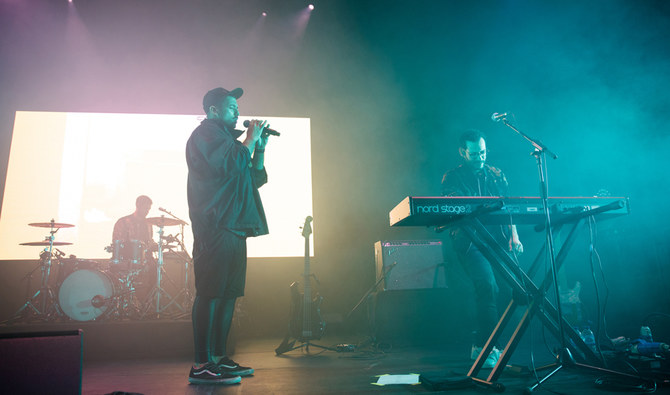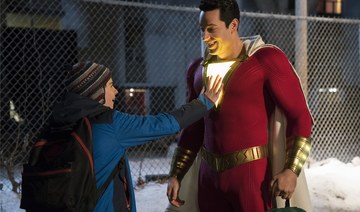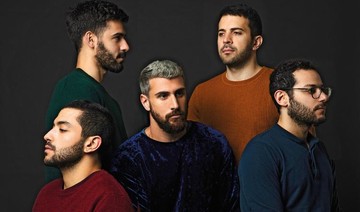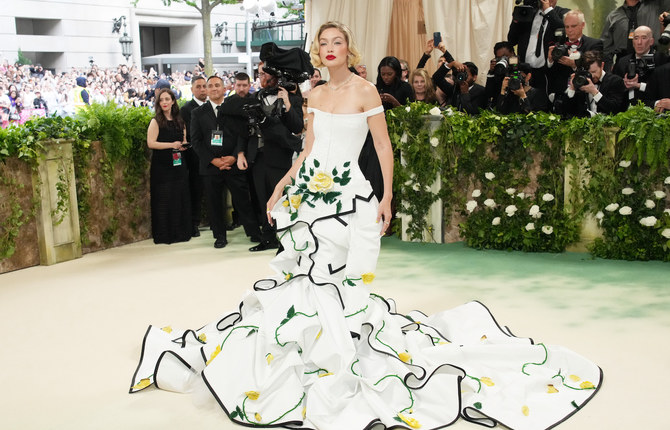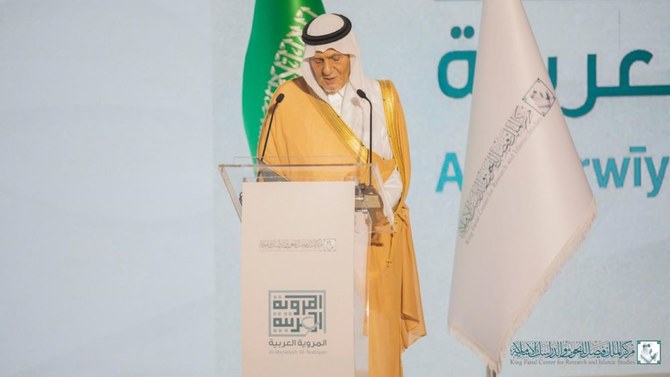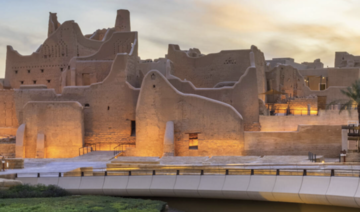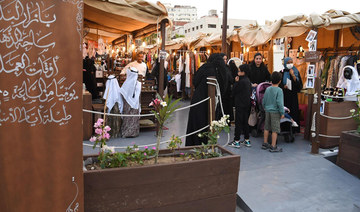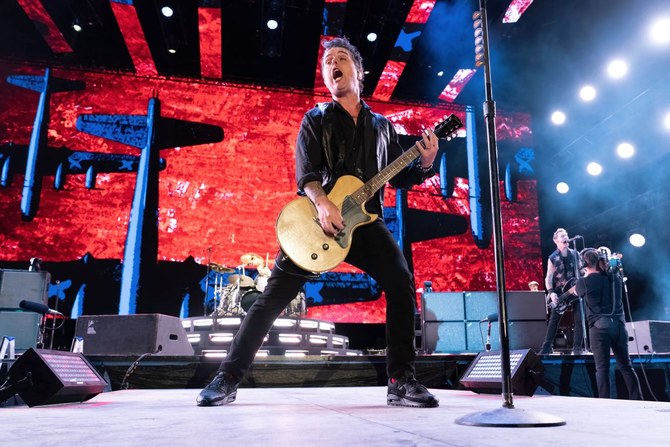DUBAI: For 10 years, Mashrou’ Leila have been at the forefront of the underground music scene in the Arab world. Their songs — from their indie-folk roots as a seven-piece to the polished electro-pop of their current work as a quartet — have provided an alternative soundtrack to the watered-down ‘habibi’ pop that dominates the mainstream music industry in the Middle East and their socially conscious lyrics have addressed the concerns of their generation. They are, arguably, the most potent force in Arabic music, as they will prove once again in Dubai on Friday, April 5, when they play the Wasla music festival alongside several of their peers.
Last month, they marked their anniversary with their biggest European tour to date and the release of their fifth album, “The Beirut School” — a sort of ‘Greatest Hits’ compilation that includes just three new tracks.
As singer Hamed Sinno explains to Arab News, that was not the original intention. The record should have been an entirely new one, the first since their 2015 album “Ibn El Leil,” which saw them grow from a regional success story into an international one, garnering widespread acclaim from European and North American media and performing a huge number of shows around the world. And they’ve done all of this out of a region in which independent, alternative musicians receive little-to-no support and, indeed, are often hindered from pursuing their careers for social or political reasons.
But the three-plus years since the release of “Ibn El Leil” have been, Sinno says, “a constant hurricane.” Despite his energetic, charismatic stage presence, Sinno — offstage — is basically an introvert. And the amped-up media attention, driven by his position as the frontman in a band that was increasingly being hailed as a driver for cultural change in the region, began to feel overwhelming for him.
“And regardless of that,” he adds, “the pace at which things started moving over the past three years — and I mean the good and the bad — you kind of lose track of what it is that you’re doing, what you want to be doing, and what you want to get out of your career. And I feel like those are things you can’t forget when you’re a musician. They need to factor into every damn decision. Really. Every other minute of your day has to be based on those things. And it just got really difficult to keep our eyes on the target.”
So difficult, in fact, that six songs into what was meant to be the new album, the band effectively split up. “We’d had a couple of long tours, but we’d also had a lot of time off, to reflect on whether or not we even wanted to still be doing this. We hit a bit of a rough spot. We started fighting about things that weren’t even our concern to start with. Honestly. It was like we brought other people’s expectations, or other people’s rubrics for what success is, into the studio, and it just felt really difficult to make any kind of decision, even about how to write a song. We had a big falling out and decided to stop,” Sinno explains.
For around nine months, the band members — Sinno, multi-instrumentalist Firas Abou Fakher, violinist Haig Parpazian and drummer Carl Gerges (bassist Ibrahim Badr recently left the group) — were, Sinno says, “under the impression that the band was over and we were just going to have a few more shows and call quits.”
Partly this was down to the inevitable internal disputes that almost every group that’s lasted as long as Mashrou’ Leila have will eventually face (as Sinno says, “I think it’s kind of miraculous that we only had our first major falling out with our fifth album rather than our second”). But it was also caused by factors way beyond the band’s control.
Following their performance at Cairo’s Music Park Festival in September 2017 a number of audience members who had been waving rainbow-colored flags in recognition of the band’s open support for LGBT rights were arrested. And the band were officially blackballed by the Egyptian musician’s syndicate, meaning they are not allowed to perform in Egypt again.
It was not the first time Mashrou’ Leila had been banned from performing in an Arab country, but it was the first time that authorities had targeted the band’s fans. Understandably, the “Cairo incident,” as Sinno refers to it, caused some heartache and serious soul-searching for the musicians.
“For a while, I felt completely defeated, for all the obvious reasons. It really did feel like a political and emotional defeat,” Sinno says. “The vibe in the band started to get really challenging; we started arguing with each other about stuff that we didn’t need to be arguing about. And I decided that maybe this wasn’t what I wanted to be doing anymore.”
Sinno used one of the new tracks, “Cavalry,” to address the frustrations that arose after the Cairo concert. “It’s really a turning point for me in how I felt about the situation,” he says. “It’s basically about embracing that defeat and just going for it anyway. It’s about not expecting to win, necessarily, but to fight anyway. Out of all the tracks we had written and had on standby, it was one that felt very valuable to us on several levels; professionally and emotionally.”
Thankfully, it seems that Mashrou’ Leila are now past their “rough spot.” The band even managed to write and record an “uncynically happy” song — “Radio Romance” — for “The Beirut School.”
“It’s a very big departure for the band — it’s very different from anything we’ve done before. Because we sort of sat down and agreed that it wouldn’t be a song that was about something horrible. It was honestly quite challenging, in the context of the last three years, to write something positive,” Sinno explains.
“We’re still negotiating how to move forward, but I think everyone’s on the same page, at least as far as intention goes, which is the most important thing at this point,” he continues. “It’s been pretty intense. But I think it was a necessary period to basically remind ourselves why we’re doing this and what it is that we’re hoping to get out of it.”
Their European tour last month has helped the band to refocus. “It was a really great tour to play. It was the first round of shows we’d played since we decided to get back together, and the nature and caliber of the venues we were playing in was kind of its own reward,” says Sinno. “It was like the cherry on top. Like, ‘Oh, this is what we’ve been given.’ Places like L’Olympia (Paris) and the Roundhouse (London). It was technically very difficult, and stressful, but it was cathartic.”
And on Friday they perform their first Middle East show since resolving to continue the Mashrou’ Leila journey. Wasla — an annual festival celebrating Arabic alternative music and now in its third year — is the kind of event that the region needs more of, Sinno suggests.
“It’s not about exposure as much as it is just sort of grouping some things together as these little monuments to what is going on in the region,” he says. “I feel like the Middle East has a history of not properly archiving and not properly looking at the work that it produces and the history of that work, so it’s always healthy to have things like festivals that you can look back at.”
To conclude, I ask him if he’s a fan of any of the other bands performing at Wasla.
“I’m actually a fan of all of the acts,” he replies without hesitation. “If for nothing else then just because I completely recognize and understand how difficult it is for anyone to still be making music in the region. I know first-hand how hard it is to devote yourself to this line of work, and the amount of negativity that comes with it. So I completely respect all of these musicians and I’m a huge fan of all of them.”




